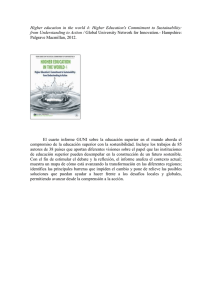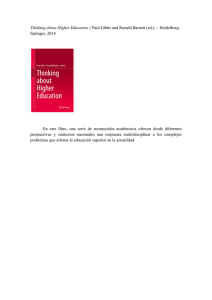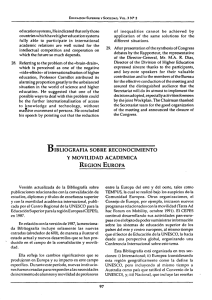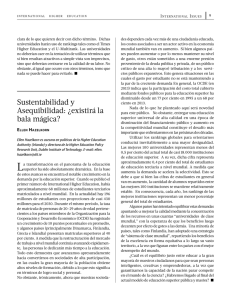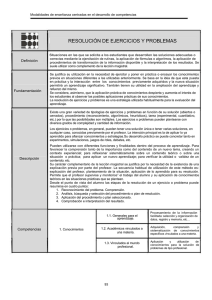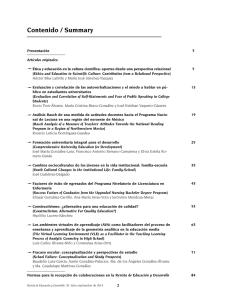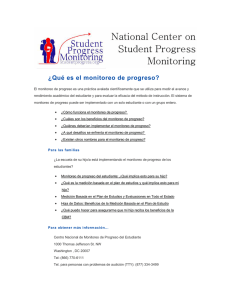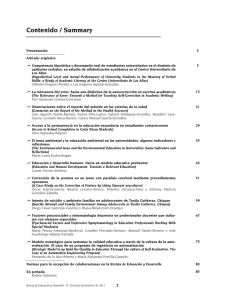Multilateral agencies and higher education reform in Latin America
Anuncio
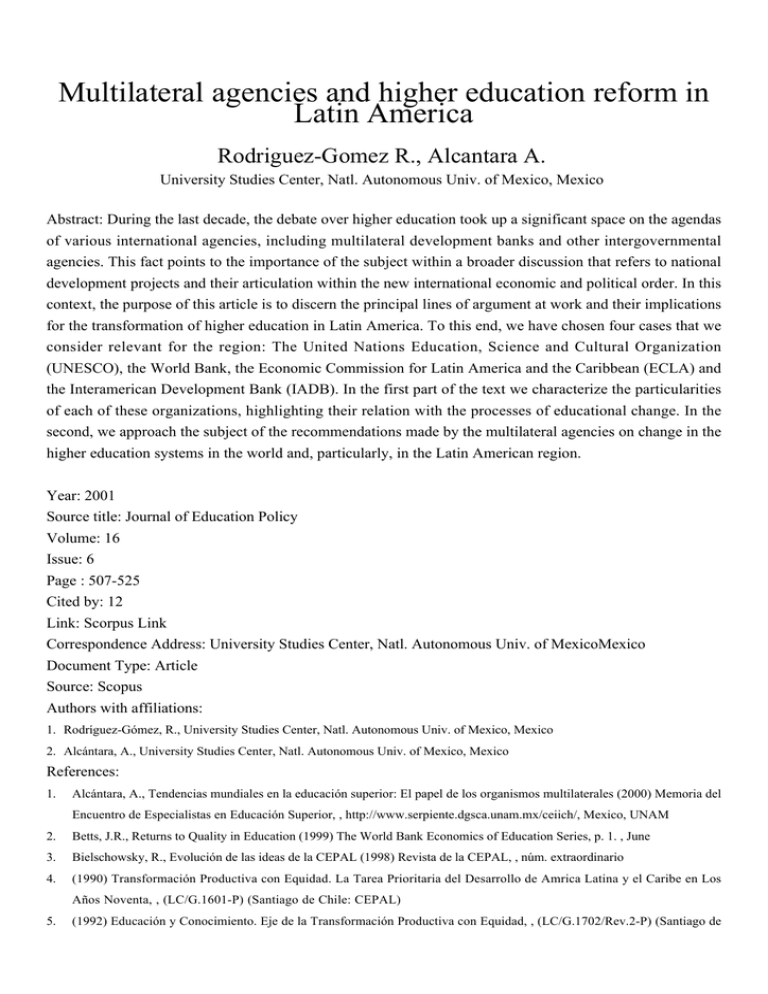
Multilateral agencies and higher education reform in Latin America Rodriguez-Gomez R., Alcantara A. University Studies Center, Natl. Autonomous Univ. of Mexico, Mexico Abstract: During the last decade, the debate over higher education took up a significant space on the agendas of various international agencies, including multilateral development banks and other intergovernmental agencies. This fact points to the importance of the subject within a broader discussion that refers to national development projects and their articulation within the new international economic and political order. In this context, the purpose of this article is to discern the principal lines of argument at work and their implications for the transformation of higher education in Latin America. To this end, we have chosen four cases that we consider relevant for the region: The United Nations Education, Science and Cultural Organization (UNESCO), the World Bank, the Economic Commission for Latin America and the Caribbean (ECLA) and the Interamerican Development Bank (IADB). In the first part of the text we characterize the particularities of each of these organizations, highlighting their relation with the processes of educational change. In the second, we approach the subject of the recommendations made by the multilateral agencies on change in the higher education systems in the world and, particularly, in the Latin American region. Year: 2001 Source title: Journal of Education Policy Volume: 16 Issue: 6 Page : 507-525 Cited by: 12 Link: Scorpus Link Correspondence Address: University Studies Center, Natl. Autonomous Univ. of MexicoMexico Document Type: Article Source: Scopus Authors with affiliations: 1. Rodríguez-Gómez, R., University Studies Center, Natl. Autonomous Univ. of Mexico, Mexico 2. Alcántara, A., University Studies Center, Natl. Autonomous Univ. of Mexico, Mexico References: 1. Alcántara, A., Tendencias mundiales en la educación superior: El papel de los organismos multilaterales (2000) Memoria del Encuentro de Especialistas en Educación Superior, , http://www.serpiente.dgsca.unam.mx/ceiich/, Mexico, UNAM 2. Betts, J.R., Returns to Quality in Education (1999) The World Bank Economics of Education Series, p. 1. , June 3. Bielschowsky, R., Evolución de las ideas de la CEPAL (1998) Revista de la CEPAL, , núm. extraordinario 4. (1990) Transformación Productiva con Equidad. La Tarea Prioritaria del Desarrollo de Amrica Latina y el Caribe en Los Años Noventa, , (LC/G.1601-P) (Santiago de Chile: CEPAL) 5. (1992) Educación y Conocimiento. Eje de la Transformación Productiva con Equidad, , (LC/G.1702/Rev.2-P) (Santiago de Chile: CEPAL) 6. Colclough, C., Education and the market: Which parts of the neoliberal solution are correct? (1996) World Development, 24 (4), pp. 589-610 7. Coraggio, J.L., Investigación educativa y decisión política. El caso del Banco Mundial en Amrica Latina (1998) Perfiles Educativos, 79-80, pp. 43-57 8. (1997) Higher Education in Latin America and the Caribbean. Strategy Paper, , Washington, DC: IADB 9. (1997) Proyecto: México, Programa de Ciencia y Tecnología, , (804/OC-ME 10. 001/SPQ-ME) (Washington, DC: IADB) 11. (1998) Project: Brazil, Science and Technology Program, , (880/OC-BR) (Washington, DC: IADB) 12. (1999) La Renovación del Compromiso Frente al Desarrollo, , Washington, DC: IADB 13. Información Básica, , http://www.iadb.org/, 199b 14. Jallade, L., Lee, E., Samoff, J., International cooperation (1994) Coping with Crisis: Austerity, Adjustment and Human Resources, , Joel Samoff (ed.) (Paris: Cassell-UNESCO) 15. Kent, R., The World Bank and UNESCO on higher education (1996) International Higher Education, 4, pp. 3-5 16. Labastida, J., Valenti, G., Villa Lever, L., (1993) Educación, Ciencia y Tecnología. Los Nuevos Desafíos para América Latina, , Mexico: UNAM 17. Malo, S., Morley, S., (1996) La Educación Superior en América Latina y el Caribe. Memoria de un Seminario de Rectores, , Washington, DC: BID-UDUAL 18. Manchón, F., Globalización, regionalización y comportamiento financiero (1995) Globalización y Bloques Económicos. Mitos y Realidades, pp. 40-57. , J. L. Calva (ed.) (Mexico: Juan Pablos) 19. Psacharopoulos, G., Returns to investment in education: A global update (1994) World Development, 22 (9), pp. 1325-1343 20. Rodríguez, R., La reforma de la educación superior. Señas del debate internacional de fin de siglo (2000) Revista Electrónica de Investigación Educativa, 2 (1). , http://redie.ens.uabc.mx/vol2nol/ 21. Schugurensky, D., La reestructuración de la educación superior en la era de la globalizaciôn. Hacia un modelo heterónomo? (1998) Educación, Democracia y Desarrollo en el Fin de Siglo, 21, pp. 118-149. , Armando Alcántara, Ricardo Pozas and Carlos A. Torres (eds) (Mexico: Siglo) 22. Schwartzman, S., Prospects for higher education in Latin America (1999) International Higher Education, 17, pp. 9-10 23. (2000) Higher Education in Developing Countries. Peril and Promise, , Washington, DC: The World Bank and UNESCO 24. Torres, C.A., (1996) Las Secretas Aventuras del Orden. Estado y Educación, , Buenos Aires: Miño y Dávila Editores 25. Torres, C.A., Schugurensky, D., The political economy of higher education in the era of neoliberal globalization: Latin America in comparative perspective Higher Education 26. Tunnermann, C., (1995) Una Nueva Visión de la Educación Superior, , San José de Costa Rica: CSUCA 27. (1995) Documento de Política para el Cambio y el Desarrollo de la Educación Superior, , Paris: UNESCO 28. (1998) La Educación Superior en el Siglo XXI. Visión y Acción (Documento de Trabajo), , Paris: UNESCO 29. (1998) Towards an Agenda for Higher Education: Challenges and Task for the Twenty-First Century Viewed in the Light of the Regional Conference, , Paris: UNESCO 30. (1998) La UNESCO y la Educación en América Latina y el Caribe 1987-1997, , Santiago de Chile: UNESCO-OREALC 31. (1999) What Is UNESCO?, , http://www.unesco.org/general/eng/about/ 32. Vilas, C.M., Estados nacionales y mercados transnacionales en la búsqueda de un desarrollo alternativo (1995) Globalización y Bloques Económicos. Mitos y Realidades, pp. 310-333. , J. L. Calva (ed.) (Mexico: Juan Pablos) 33. (1994) Higher Education, the Lessonsfrom Experience, , Washington, DC: The World Bank 34. (1995) Priorities and Strategies for Education. A World Bank Review, , Washington, DC: The World Bank 35. (1999) The World Bank Mission, , http://www.worldbank.org 36. (1999) Latin America & The Caribbean Bank Assistance, , http://www.worldbank.org/html/extpb/annrep/lac1.htm 37. (1999) Education Sector Strategy, , Washington DC, The World Bank 38. (1999) Education Change in Latin America and the Caribbean: A World Bank Strategy Document, , Washington, DC: The World Bank 39. (2000) Informe Anual 1999, , Washington, DC: The World Bank
